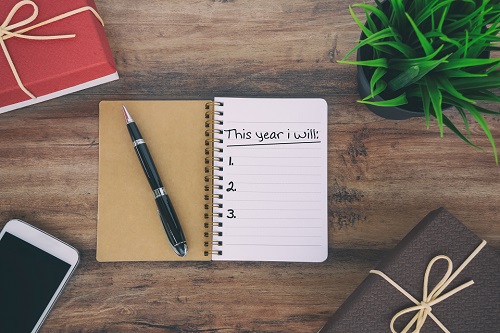Tips for Making Lasting Changes in the New Year

Finally, it’s 2021! The new year is upon us. For many, a new year can mean new beginnings and changes. Now is a good time for self-reflection. How would you like the new year to be different from the last? What do you want to change? I’m not talking New Year’s resolutions where less than half of people who make them are successful.1 I’m talking sustainable lifestyle changes. What makes people successful at making lasting changes? Self-efficacy: the amount of personal control that we expect to have over a behavior in difficult situations.2
New Year Resolutions
Some common New Year’s resolutions are:
- Exercise more.
- Lose weight.
- Get organized.
- Quit smoking.
You may have an idea about what would bring more health, happiness and prosperity into your 2021. What can help you work toward these goals? Here are some tips that may give you clarity, fuel your desire and build your confidence.
- Take personal inventory. What changes did you plan in 2020? What worked for you? What didn’t work?
- Set a goal that motivates you. A goal that is important to you has value or benefit. This is your “why” behind your change goal.
- “One and done” and “less is more.” You may have heard these phrases. Making too many goals or setting unrealistic goals can lead to burnout and dropout. Setting one or two goals can help you channel your energy effectively.
- Make a SMART goal.
SMART Goals
Specific (Example: “I will walk at least once a day.”)
Measurable (Example: “I will walk at least once a day for 20 minutes, three days a week.”)
Attainable (Make it a goal you can realistically achieve.)
Relevant (A fitness-related goal is relevant if your health is a top priority.)
Time-sensitive (Set a goal you can start on relatively soon. For example, by February 1.)
- Break up your goal into smaller daily, weekly and monthly tasks. For example, to meet your exercise goal by February 1, what do you need to do today to prepare? This could include buying new running shoes, scheduling childcare or deciding which days work best for your schedule.
- Write down your goals. This shows intention, provides a visual reminder and allows you to document your progress.
- Make yourself accountable. Find an accountability partner or coach. Tell another person. Post your goal on social media. When we are accountable to another person, this sense of obligation is a powerful motivator. Set regular appointments to update your accountability partner.
- For the tech-savvy folks, use apps and calendar reminders.
- Review your goal regularly. Plan monthly, weekly and daily reviews of tasks to complete.
- Setbacks, delays and mistakes are inevitable. Brush yourself off and get back on your horse (the sooner, the better). We are not machines. We are humans. So, when some daily tasks are completed late, it’s better late than never. When circumstances get in the way, think of it as an opportunity to adapt, grow, learn, build resilience or create. Journal about your setback. For example, when I hit the snooze button on my alarm, I’m rushed during my morning routine and talk myself out of exercising.
- Reward yourself. Working toward a goal, especially when you don’t feel like it, takes fortitude and determination. Rewarding yourself for following through brings joy into your journey.
References
- https://www.goskills.com/Soft-Skills/Resources/Top-10-new-years-resolutions
- https://practicalhealthpsychology.com/2019/07/self-efficacy-the-can-do-belief-that-lets-people-change-their-lifestyles/
Additional Kidney Diet Resources
Visit DaVita.com and explore these diet and nutrition resources:
- DaVita Food Analyzer
- DaVita Dining Out Guides
- Today’s Kidney Diet Cookbooks
- DaVita Kidney-Friendly Recipes
- Diet and Nutrition Articles
- Diet and Nutrition Videos
- Kidney Smart® Virtual Classes
This article is for informational purposes only and is not a substitute for medical advice or treatment. Consult your physician and dietitian regarding your specific diagnosis, treatment, diet and health questions.

Recent Comments